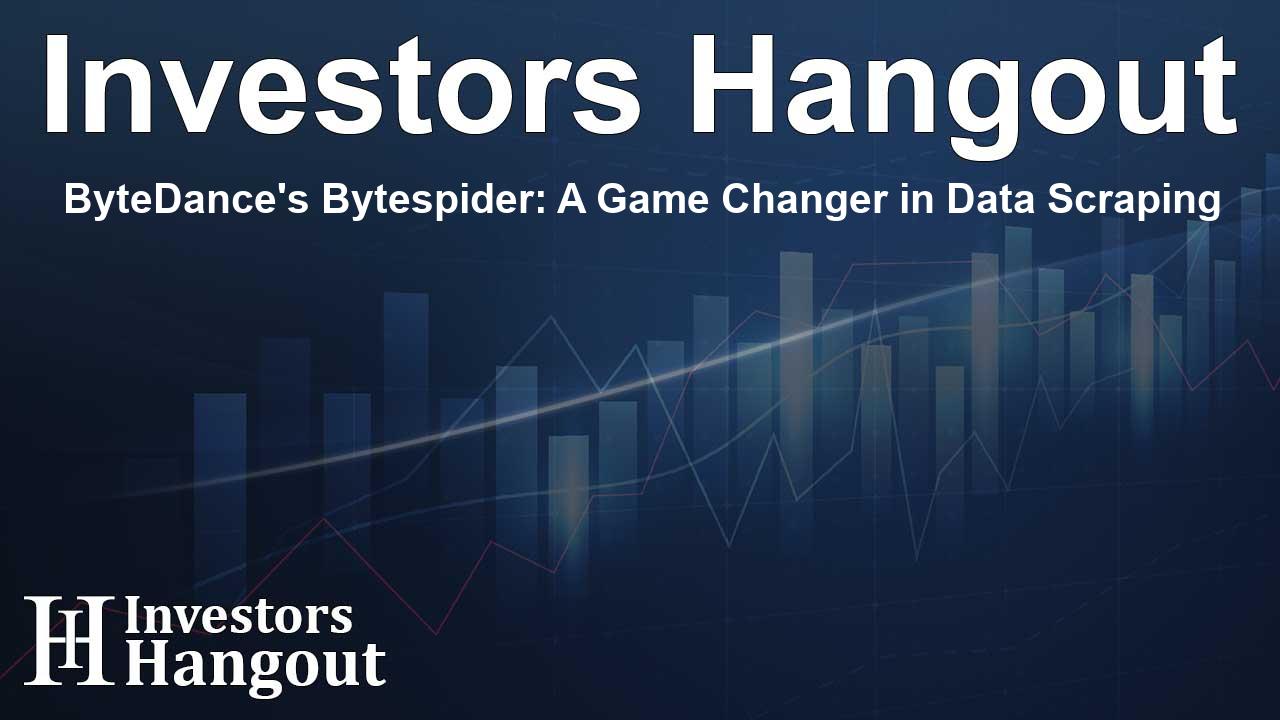ByteDance's Bytespider: A Game Changer in Data Scraping

ByteDance Introduces an Aggressive Data Collection Tool
ByteDance, the parent company of TikTok, has recently launched a formidable web scraper known as "Bytespider." Introduced in April, this tool is gaining recognition for its swift and aggressive data collection capabilities, significantly outpacing its competitors in the tech industry.
Bytespider's Remarkable Speed
Recent research by a bot management firm has shown that Bytespider operates at an astonishing pace. Reports from industry experts indicate that it collects data 25 times faster than OpenAI's GPTbot, the engine behind ChatGPT, and an astounding 3,000 times faster than ClaudeBot from Anthropic. This rapid data gathering strategy raises eyebrows about how data privacy and ethics are handled in technology.
Concerns Amidst TikTok's US Regulatory Challenges
With the future of TikTok hanging in the balance, as lawmakers are considering a ban due to national security concerns, ByteDance's aggressive tactics appear to persist unabated. This dynamic is compounded by President Joe Biden's calls for the sale or closure of TikTok. Bytespider's tendency to ignore the robots.txt code, which typically advises scrapers on ethical data usage, intensifies the ongoing debate regarding responsible data collection practices.
Enhancing TikTok's Search Capabilities
One of the reasons behind the increased web scraping activity is the company's efforts in developing an advanced large language model (LLM). This model is designed to refine TikTok’s search functionalities, allowing users to conduct real-time keyword searches to enhance the visibility of ads. This update signals ByteDance's commitment to driving user engagement and optimizing advertising strategies on its platform.
Industry Trends in Web Scraping
The aggressive techniques employed by ByteDance are part of a larger trend observed among leading technology firms. Earlier in the year, major players such as OpenAI and Anthropic faced criticism for disregarding web scraping guidelines, highlighting a growing concern over the intersection of AI and ethical data use. As such practices are scrutinized, the implications for user privacy and data ownership remain a critical discussion point in the tech community.
Challenges Faced by Major Tech Companies
The conversation around web scraping isn’t limited to ByteDance. For example, NVIDIA found itself in hot water for scraping content from platforms like YouTube to train its AI models, raising questions about content creator rights. Similarly, Microsoft faced backlash for allegedly using LinkedIn user data for AI training without updating its terms of service, particularly affecting U.S. users. These instances highlight a broader challenge within the industry regarding the balance of technological advancement and user rights.
ByteDance's Response
As of now, ByteDance has not publicly addressed the various media inquiries regarding Bytespider’s launch and its potential implications for users and the tech landscape at large. The company's hesitance to engage in this dialogue points to a larger issue of transparency that consumers are increasingly demanding from tech giants.
Looking Ahead to the Future of Data Collection
As ByteDance continues to enhance its web scraping capabilities, industry observers speculate on what this means for both users and competitors. This aggressive approach may set new standards for data collection, prompting discussions around the necessary frameworks and regulations to protect user data and rights in an ever-evolving digital landscape.
Frequently Asked Questions
What is Bytespider and why is it significant?
Bytespider is a web scraping bot launched by ByteDance that collects data much faster than its competitors, raising concerns about aggressive data collection practices.
How does Bytespider compare to other web scrapers like GPTbot?
Bytespider is reportedly 25 times faster than GPTbot from OpenAI and significantly outpaces many other technologies in terms of data collection speed.
Why is there concern about ByteDance's data collection methods?
Concerns arise from Bytespider's disregard for protocols like robots.txt, which suggests ethical practices in data scraping, amidst ongoing scrutiny of TikTok's operations.
What are the implications of ByteDance's web scraping for users?
The aggressive data collection approach may affect user privacy, raise ethical questions, and challenge existing regulations regarding data usage in technology.
What actions are being taken by lawmakers regarding TikTok?
Lawmakers, led by President Biden, are exploring options to either sell or ban TikTok due to national security concerns, further complicating ByteDance's strategies.
About Investors Hangout
Investors Hangout is a leading online stock forum for financial discussion and learning, offering a wide range of free tools and resources. It draws in traders of all levels, who exchange market knowledge, investigate trading tactics, and keep an eye on industry developments in real time. Featuring financial articles, stock message boards, quotes, charts, company profiles, and live news updates. Through cooperative learning and a wealth of informational resources, it helps users from novices creating their first portfolios to experts honing their techniques. Join Investors Hangout today: https://investorshangout.com/
Disclaimer: The content of this article is solely for general informational purposes only; it does not represent legal, financial, or investment advice. Investors Hangout does not offer financial advice; the author is not a licensed financial advisor. Consult a qualified advisor before making any financial or investment decisions based on this article. The author's interpretation of publicly available data shapes the opinions presented here; as a result, they should not be taken as advice to purchase, sell, or hold any securities mentioned or any other investments. The author does not guarantee the accuracy, completeness, or timeliness of any material, providing it "as is." Information and market conditions may change; past performance is not indicative of future outcomes. If any of the material offered here is inaccurate, please contact us for corrections.